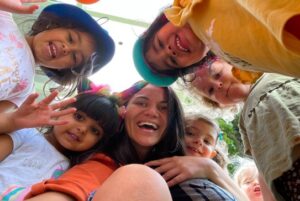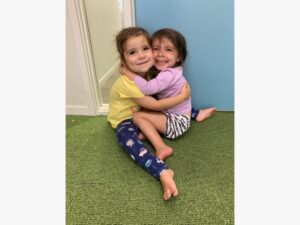Developing Social and Emotional Competence in Early Learning.
What is it all about?
In early childhood we work within our curriculum Te Whāriki, (2017). Te whāriki has its main aspiration which is for children to be “competent and confident learners and communicators, healthy in mind, body and spirit, secure in their sense of belonging and in the knowledge that they make a valued contribution to society”. (p.5)
Us Kaiako here at Elm Tree really value and work hard to ensure this is the case for each child that attends our centre. We use two key documents, our curriculum and He Māpuna te Tamaiti – Supporting social and emotional competence in early learning, (2019). We embed the content these documents put out by the Ministry of Education (M.O.E) throughout our everyday practice and together in partnership with whānau help children grow into socially and emotionally competent young people.

So, what is social and emotional competence?
Social and emotional competence is the ability to interact with others, regulate one’s own emotions and behaviour, solve problems, and communicate effectively. Children who are socially and emotionally competent have:
- Healthy self-esteem
- Self-confidence
- Self-efficacy
- Self-control
- Personal agency
- Patience
- Persistence
- Conflict resolution skills
- Communication skills
- Empathy
- Social skills
- Morality
Children who have these characteristics are not just successful in the early childhood setting. They are successful in life. There is strong research evidence that social and emotional development contributes to development across domains: cognitive, physical, communication. In many ways, social and emotional development opens the door to richer and deeper learning. In early childhood, we understand that relationships are the foundation of all learning, so it makes sense that having strong relationships helps children learn.
There are three main ways teachers working with preschool age children can promote social and emotional competence:
- Teaching or helping children learn to recognise and deal with their emotions
- Teaching or helping children learn to recognise and solve social problems
- Teaching or helping children learn to be friends

Emotional Literacy
Emotional literacy is the ability to recognise emotions in yourself and others. It is also the ability to express and regulate emotions. Early childhood centres that promote emotional literacy talk about emotions throughout the day every day. Adults label their own emotions and children’s emotions. They read stories about emotions. They help children recognise emotions in themselves and others. Teachers also provide concrete strategies to help children address and express their emotions appropriately.
Problem-Solving
All of us experience problems. Our success lies in how we deal with those problems. The skill of successfully navigating complex social situations does not necessarily come naturally. In early childhood centres that foster social and emotional competence, children are taught specific strategies for solving social problems. They may learn to recognise they have a problem, think of solutions, think about what would happen, and give it a try. Adults may also help children generate solutions to try.

Friendship Skills
Learning how to make and keep friends is a lifelong skill. There are a variety of skills that are considered friendship skills.
These include:
- Asking to join others in play
- Offering ideas and suggestions
- Sharing
- Taking turns
- Giving compliments
- Knowing how and when to apologise
In Early childhood centres that foster social and emotional competence, staff members look for opportunities to promote friendship skills. They encourage friendly behaviour, model friendly behaviour, and set up opportunities for children to practice friendship skills.
We love working alongside children, their parents and whānau to support and help children to grow in all areas. We value social and emotional competence and believe that through strong, trusting, and respectful relationships we can help build children to be lifelong learners.
Nicola and the Elm Tree team.
References:
Center for the Study of Social Policy, (2013)
Te Whariki – He whariki matauranga mo nga mokopuna o Aotearoa. Early Childhood Curriculum, Ministry of Education, 2017.
He Mapuna te Tamaiti – Supporting Social and Emotional Competence in Early Learning, Ministry of Education, 2019.

